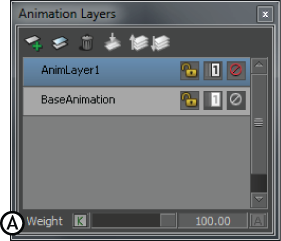Each animation layer has a Weight value that determines how much of its animation plays in the result animation. (See Result animation.)
When the Weight is set to 100, all of the layer’s animation plays in the result. A Weight value of 0 means none of the layer’s animation plays in the result.

Animation Layer editor A. Weight slider
As the result animation is calculated, the properties of the animation layer are multiplied by the layer’s Weight value. For example, if you animate a bouncing ball along the Y-axis on AnimLayer1, then decrease the Weight value to 50, the ball only bounces half as high when you playback the animation of AnimLayer1.
When layers are parented, the child layer is affected by the weight of the parent layer. See Weighting layers in a hierarchy.
If you are working with a layer in Override-Passthrough mode, the Weight value also lets you control the opacity of the Override layer. See Override-Passthrough mode.
You can animate a selected layer’s Weight property from the FCurves, Properties, and Dopesheet windows as well as from the Animation Layer editor. See Keyframing the weight of animation layers.
 Except where otherwise noted, this work is licensed under a Creative Commons Attribution-NonCommercial-ShareAlike 3.0 Unported License
Except where otherwise noted, this work is licensed under a Creative Commons Attribution-NonCommercial-ShareAlike 3.0 Unported License